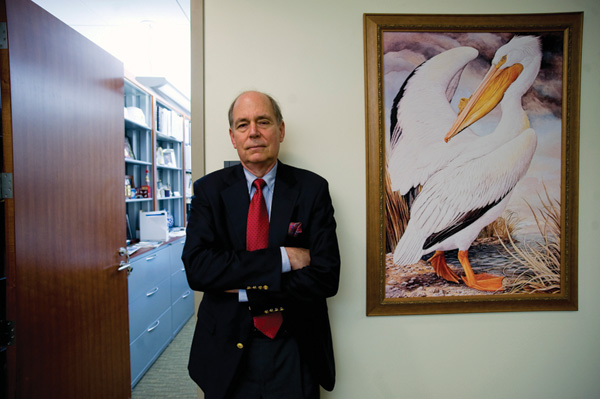
Eric Smith is a clinical professor of finance and associate director of the Tulane Energy Institute.
By Eric Smith
The Macondo Blowout, the world’s worst accidental marine oil spill, has been essentially under control since mid-July, when BP installed a mini BOP and transition spool on the well, but the disaster continues thanks to our federal government. On May 30, U.S. Secretary of the Interior Ken Salazar declared a six-month moratorium on all drilling activity in the Gulf of Mexico pending the outcome of a study by a presidential commission made up of politically correct members with no discernable knowledge of offshore activity. The potential for economic disaster here in Louisiana and across the Gulf Coast is significant, and the magnitude might actually exceed the damage caused by the physical blowout. This second “manmade” disaster has its roots in ideology and politics, not in safety or a cautious review prior to issuing new regulations.
The moratorium has idled 34 very expensive floating rigs that were actively engaged in exploring and developing deep-water Gulf of Mexico oil leases, arguably the only hydrocarbon growth market in the U.S. Gulf and one of very few oil sources in the entire U.S. that are seeing any growth. In addition, eight new rigs mobilizing to the area over the next 18 months are figuratively sailing into a black hole as their ability to actually work when they arrive in the U.S. Gulf of Mexico is in question.
 The difficulty is that the government’s position takes no account of the financing that enabled these rigs to be built. Basically, the collateral for the loans is not the vessel itself but rather a signed “take or pay” multiyear drilling contract with a credit worthy oil and gas operator. These contracts require the operator to make payments regardless of whether the rig is drilling or not. With delivered prices exceeding $500 million per rig and basic day rates exceeding $500,000 per day, some operators attempted to declare “force majeure” and walk away from the contracts.
The difficulty is that the government’s position takes no account of the financing that enabled these rigs to be built. Basically, the collateral for the loans is not the vessel itself but rather a signed “take or pay” multiyear drilling contract with a credit worthy oil and gas operator. These contracts require the operator to make payments regardless of whether the rig is drilling or not. With delivered prices exceeding $500 million per rig and basic day rates exceeding $500,000 per day, some operators attempted to declare “force majeure” and walk away from the contracts.
Drilling contractors responded with a legal argument that arbitrary and capricious government action is not a valid trigger of a notice of force majeure but more an issue of sovereign risk. U.S. sovereign risk has not been a major factor in drilling contracts, so the operators are unprepared to answer the criticism. In other parts of the world where this is a recognized risk, operators purchase sovereign risk insurance. (Perhaps such insurance will become a growth market for underwriters at Lloyds.)
Even in two cases where force majeure notices were accepted by the contract driller, the costs to the abrogating operator were horrendous, for example payment of minimum day rates of $500,000 per day for up to six months. It is this fundamental take-or-pay feature which means that the term “non-working deepwater rigs” is a non sequitur. If rigs can’t work in the U.S. Gulf, they will move and sign new multiyear contracts in countries where they can work and where their valid drilling contracts will be honored. One rig has already moved to Egypt and another to the Democratic Republic of the Congo.
That is why it really doesn’t matter what the duration of the moratorium is or what the eventual outcome of the presidential commission is. The only thing that matters is whether those rigs leave and sign new multiyear contracts to work outside of the U.S. Gulf. With both Brazil and West Africa facing a near-term shortage of deep water drilling equipment, some moves will be inevitable. If half of the rigs move and are not replaced because of the fear of unilateral U.S. government action, then the practical moratorium could last years rather than months and the associated jobs as well as industry infrastructure will be the victims.
With the Macondo well essentially plugged, the story will migrate from the Gulf of Mexico to the nation’s courtrooms, where resolution will take years and the outcome will range between moot and pyrrhic. Somehow, I’m reminded of that ancient prayer, “Lord, I can handle my enemies. Please protect me from my friends …”
